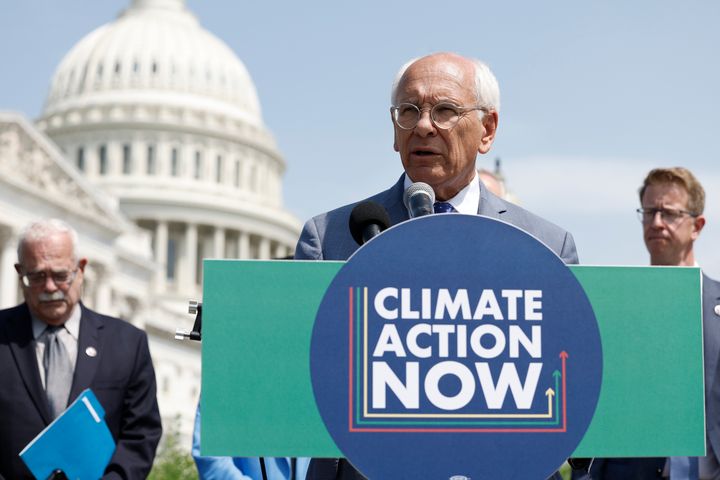WASHINGTON ― Four high-ranking congressional Democrats condemned a decision the private entity that sets the country’s default homebuilding guidelines made this week, which will gut requirements for new houses and offices to include the wiring for electric heaters, EV chargers and solar panels.
In November, trade associations representing the natural gas industry launched 11th-hour appeals to the International Code Council, the nonprofit consortium of local governments and industry groups in charge of writing the model building codes used in almost all U.S. states.
The gas groups asked the ICC to scrap new tweaks in its latest update to the codes that would make it cheaper for homeowners to go electric. While requiring the circuitry for electric appliances and vehicles might add a few thousand dollars to a new home’s asking price, it would cost the typical homeowner tens of thousands of dollars in renovations to rewire pre-built walls themselves.
The ICC’s appeals board rejected those asks earlier this month. But on Wednesday, the ICC’s board of directors overturned that ruling, stripping the pro-electrification provisions out of the latest codebook and handing gas utilities and furnace manufacturers a surprise victory.
“This is a real scandal,” Sen. Jeff Merkley (D-Ore.) told HuffPost over email. “At the urging of fossil fuel companies, the ICC’s leadership has overruled its own experts and blocked code changes that would help electrify buildings and reduce reliance on fossil gas. This is a big setback for combatting climate chaos.”

Sen. Ed Markey (D-Mass.), who has close ties to progressive climate movement groups, accused gas companies of “running up the tab for homeowners by attacking energy-efficient and electric appliances.”
“The International Code Council has the big job of driving our nation’s model building codes,” Markey said in an emailed statement. “But its board turned over the keys to Big Gas, which used an undemocratic and non-transparent process to attack and roll back measures in the already-finalized 2024 codes that would have cut costs and made homes cleaner through electrification.”
Rep. Frank Pallone (D-N.J.) was among three top-ranked House Democrats who last week sent the ICC a letter warning the board of directors against granting the gas groups’ appeals.
“This backroom deal is clearly a handout to the board’s corporate polluter and special interest friends, and it raises serious questions about the integrity of both this process and the ICC as an organization,” Pallone, the ranking member on the House Energy and Commerce Committee, told HuffPost on Thursday. “I look forward to getting answers and holding this group accountable”

In an interview Thursday on Capitol Hill, Rep. Paul Tonko (D-N.Y.), who had also signed onto Pallone’s letter, said Congress needs to “continue the advocacy” and maintain engagement with the ICC.
“I’m hoping we can work out some arrangement where the codes are addressed and respond to greening up,” he said.
Federal law dating back nearly two decades requires the U.S. government to write its own national building code that can be used when granting loans to homebuyers. But no agencies have actually done that, and until they do, the law allows them to use the ICC’s codes as a substitute.
The law also directs federal agencies to assess the ICC’s latest energy codes every three years and determine whether they cut back on wasted electricity and heat, among other things. If the new rules pass muster, the government is supposed to put them in place as part of the criteria for federal housing loans.
Despite this mandate, the federal government has routinely violated the law by either slow-walking updates to loan requirements or loosening the standards to the point of making them ineffective. The only update came in 2015, when the Obama administration made the ICC’s 2009-level energy codes the standard for new federal housing loans.
The Biden administration signaled last year it would increase the standard to the 2021 codes, which would represent a huge leap in terms of energy efficiency rules for states still using the old codes. But the proposal to actually update the requirements for housing loans, which would likely prove politically polarizing in red states, remains stalled in the bureaucracy.
Advocacy groups recently formed a nationwide network called the National Energy Codes Collaborative, which is scheduled to begin meeting to support states updating to more energy-efficient codes this May.
While none of the lawmakers endorsed those specific efforts, Tonko said Congress should “advise” the ICC to provide “input and and just share our concern.”
“We need to take climate seriously,” he said. “I’m hoping we can work out some arrangement where the codes are addressed and respond to greening up. We need to do that.”
This article has been updated to better reflect the NECC’s goals.
Disclaimer: The copyright of this article belongs to the original author. Reposting this article is solely for the purpose of information dissemination and does not constitute any investment advice. If there is any infringement, please contact us immediately. We will make corrections or deletions as necessary. Thank you.
